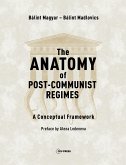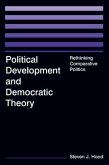Balint Magyar, Balint Madlovics
A Concise Field Guide to Post-Communist Regimes
Actors, Institutions, and Dynamics
Schade – dieser Artikel ist leider ausverkauft. Sobald wir wissen, ob und wann der Artikel wieder verfügbar ist, informieren wir Sie an dieser Stelle.
Balint Magyar, Balint Madlovics
A Concise Field Guide to Post-Communist Regimes
Actors, Institutions, and Dynamics
- Broschiertes Buch
- Merkliste
- Auf die Merkliste
- Bewerten Bewerten
- Teilen
- Produkt teilen
- Produkterinnerung
- Produkterinnerung
Arguement for a vocabulary and grammar tailored specifically to post-communist countries rather than relying on Western democracy concepts, presents a framework in 120 theses that include a typology of post-communist regimes and detailed presentations of ideal-type actors and political, economic, and social phenomena in these regimes.
Andere Kunden interessierten sich auch für
![The Anatomy of Post-Communist Regimes The Anatomy of Post-Communist Regimes]() Balint Magyar (CEU Democracy Institute Research Fellow)The Anatomy of Post-Communist Regimes86,99 €
Balint Magyar (CEU Democracy Institute Research Fellow)The Anatomy of Post-Communist Regimes86,99 €![A Region of Regimes A Region of Regimes]() T. J. PempelA Region of Regimes41,99 €
T. J. PempelA Region of Regimes41,99 €![Post-Communist Mafia State Post-Communist Mafia State]() Balint MagyarPost-Communist Mafia State88,99 €
Balint MagyarPost-Communist Mafia State88,99 €![World History in Minutes World History in Minutes]() Dorothy AilWorld History in Minutes10,99 €
Dorothy AilWorld History in Minutes10,99 €![Democracies and Authoritarian Regimes Democracies and Authoritarian Regimes]() Andrea Kendall-Taylor (Director of the Transatlantic Security ProgrDemocracies and Authoritarian Regimes79,99 €
Andrea Kendall-Taylor (Director of the Transatlantic Security ProgrDemocracies and Authoritarian Regimes79,99 €![Political Development and Democratic Theory Political Development and Democratic Theory]() Steven J. HoodPolitical Development and Democratic Theory63,99 €
Steven J. HoodPolitical Development and Democratic Theory63,99 €![Emerging Digital Citizenship Regimes Emerging Digital Citizenship Regimes]() Dr Igor Calzada (UK Cardiff University)Emerging Digital Citizenship Regimes65,99 €
Dr Igor Calzada (UK Cardiff University)Emerging Digital Citizenship Regimes65,99 €-
-
Arguement for a vocabulary and grammar tailored specifically to post-communist countries rather than relying on Western democracy concepts, presents a framework in 120 theses that include a typology of post-communist regimes and detailed presentations of ideal-type actors and political, economic, and social phenomena in these regimes.
Produktdetails
- Produktdetails
- Verlag: Central European University Press
- Seitenzahl: 264
- Erscheinungstermin: 30. September 2022
- Englisch
- Abmessung: 229mm x 152mm x 15mm
- Gewicht: 408g
- ISBN-13: 9789633865873
- ISBN-10: 9633865875
- Artikelnr.: 63597681
- Herstellerkennzeichnung
- Libri GmbH
- Europaallee 1
- 36244 Bad Hersfeld
- gpsr@libri.de
- Verlag: Central European University Press
- Seitenzahl: 264
- Erscheinungstermin: 30. September 2022
- Englisch
- Abmessung: 229mm x 152mm x 15mm
- Gewicht: 408g
- ISBN-13: 9789633865873
- ISBN-10: 9633865875
- Artikelnr.: 63597681
- Herstellerkennzeichnung
- Libri GmbH
- Europaallee 1
- 36244 Bad Hersfeld
- gpsr@libri.de
Bálint Magyar is Research Fellow at CEU Democracy Institute, working on the subject of patronalism in post-communist countries. He was a member of the Hungarian Parliament (1990-2010). As a Minister of Education (1996-1998; 2002-2006) he initiated and carried out reforms in public and higher education. Bálint Madlovics (*1993) is a political scientist and economist. He is a junior research fellow at the CEU Democracy Institute. He holds MA in Political Science (2018) from Central European University in Budapest, and BA in Applied Economics (2016) from Corvinus University of Budapest.
Foreword: A New Paradigm for Understanding Post-Communist Regimes
Oleksandr Fisun User's guide to the bookI. The Conceptual Framework: 120
Propositions Trapped in the Language of Liberal Democracy Dissolving Axiom
#1: Stubborn Structures and the Region's Development Dissolving Axiom #2:
Formality and Informality Dissolving Axiom #3: From Constitutional State to
the Mafia State A Sui Generis Phenomenon: the Adopted Political Family The
Formal Institutional Setting: Changing Patterns of Legitimacy Legislation
and the Legal System: From the Rule of Law to the Law of Rule Defensive
Mechanisms: Stability and Erosion of Democracies and Autocracies Relational
Economics: Corruption, Predation, and the Redistribution of Markets
Market-Exploiting Dictatorship: Coexistence of the Three Economic
Mechanisms in China Clientage Society and the Social Stability of Patronal
Autocracy Populism: an Ideological Instrument for the Political Program of
Morally Unconstrained Collective Egoism Beyond Regime Specificities:
Country-, Policy-, and Era-Specific Features Post-Communist Regime
Trajectories: A Triangular FrameworkII. Trajectories of Twelve
Post-Communist Regimes Estonia: Regime Change to Liberal Democracy Romania:
Regime Change to Patronal Democracy Kazakhstan: Regime Change to Patronal
Autocracy China: Model Change to Market-Exploiting Dictatorship Czech
Republic: Backsliding Toward Patronal Democracy Poland: Backsliding Toward
Conservative Autocracy Hungary: Backsliding to Patronal Autocracy from
Liberal Democracy Russia: Backsliding to Patronal Autocracy from Oligarchic
Anarchy Ukraine: Regime Cycles with Color Revolutions North Macedonia:
Regime Cycle with Intra-Elite Conflict Moldova: Regime Cycles with Foreign
Interference Georgia: An Attempt to Break the Regime Cycle, Notes, About
the Authors
Oleksandr Fisun User's guide to the bookI. The Conceptual Framework: 120
Propositions Trapped in the Language of Liberal Democracy Dissolving Axiom
#1: Stubborn Structures and the Region's Development Dissolving Axiom #2:
Formality and Informality Dissolving Axiom #3: From Constitutional State to
the Mafia State A Sui Generis Phenomenon: the Adopted Political Family The
Formal Institutional Setting: Changing Patterns of Legitimacy Legislation
and the Legal System: From the Rule of Law to the Law of Rule Defensive
Mechanisms: Stability and Erosion of Democracies and Autocracies Relational
Economics: Corruption, Predation, and the Redistribution of Markets
Market-Exploiting Dictatorship: Coexistence of the Three Economic
Mechanisms in China Clientage Society and the Social Stability of Patronal
Autocracy Populism: an Ideological Instrument for the Political Program of
Morally Unconstrained Collective Egoism Beyond Regime Specificities:
Country-, Policy-, and Era-Specific Features Post-Communist Regime
Trajectories: A Triangular FrameworkII. Trajectories of Twelve
Post-Communist Regimes Estonia: Regime Change to Liberal Democracy Romania:
Regime Change to Patronal Democracy Kazakhstan: Regime Change to Patronal
Autocracy China: Model Change to Market-Exploiting Dictatorship Czech
Republic: Backsliding Toward Patronal Democracy Poland: Backsliding Toward
Conservative Autocracy Hungary: Backsliding to Patronal Autocracy from
Liberal Democracy Russia: Backsliding to Patronal Autocracy from Oligarchic
Anarchy Ukraine: Regime Cycles with Color Revolutions North Macedonia:
Regime Cycle with Intra-Elite Conflict Moldova: Regime Cycles with Foreign
Interference Georgia: An Attempt to Break the Regime Cycle, Notes, About
the Authors
Foreword: A New Paradigm for Understanding Post-Communist Regimes
Oleksandr Fisun User's guide to the bookI. The Conceptual Framework: 120
Propositions Trapped in the Language of Liberal Democracy Dissolving Axiom
#1: Stubborn Structures and the Region's Development Dissolving Axiom #2:
Formality and Informality Dissolving Axiom #3: From Constitutional State to
the Mafia State A Sui Generis Phenomenon: the Adopted Political Family The
Formal Institutional Setting: Changing Patterns of Legitimacy Legislation
and the Legal System: From the Rule of Law to the Law of Rule Defensive
Mechanisms: Stability and Erosion of Democracies and Autocracies Relational
Economics: Corruption, Predation, and the Redistribution of Markets
Market-Exploiting Dictatorship: Coexistence of the Three Economic
Mechanisms in China Clientage Society and the Social Stability of Patronal
Autocracy Populism: an Ideological Instrument for the Political Program of
Morally Unconstrained Collective Egoism Beyond Regime Specificities:
Country-, Policy-, and Era-Specific Features Post-Communist Regime
Trajectories: A Triangular FrameworkII. Trajectories of Twelve
Post-Communist Regimes Estonia: Regime Change to Liberal Democracy Romania:
Regime Change to Patronal Democracy Kazakhstan: Regime Change to Patronal
Autocracy China: Model Change to Market-Exploiting Dictatorship Czech
Republic: Backsliding Toward Patronal Democracy Poland: Backsliding Toward
Conservative Autocracy Hungary: Backsliding to Patronal Autocracy from
Liberal Democracy Russia: Backsliding to Patronal Autocracy from Oligarchic
Anarchy Ukraine: Regime Cycles with Color Revolutions North Macedonia:
Regime Cycle with Intra-Elite Conflict Moldova: Regime Cycles with Foreign
Interference Georgia: An Attempt to Break the Regime Cycle, Notes, About
the Authors
Oleksandr Fisun User's guide to the bookI. The Conceptual Framework: 120
Propositions Trapped in the Language of Liberal Democracy Dissolving Axiom
#1: Stubborn Structures and the Region's Development Dissolving Axiom #2:
Formality and Informality Dissolving Axiom #3: From Constitutional State to
the Mafia State A Sui Generis Phenomenon: the Adopted Political Family The
Formal Institutional Setting: Changing Patterns of Legitimacy Legislation
and the Legal System: From the Rule of Law to the Law of Rule Defensive
Mechanisms: Stability and Erosion of Democracies and Autocracies Relational
Economics: Corruption, Predation, and the Redistribution of Markets
Market-Exploiting Dictatorship: Coexistence of the Three Economic
Mechanisms in China Clientage Society and the Social Stability of Patronal
Autocracy Populism: an Ideological Instrument for the Political Program of
Morally Unconstrained Collective Egoism Beyond Regime Specificities:
Country-, Policy-, and Era-Specific Features Post-Communist Regime
Trajectories: A Triangular FrameworkII. Trajectories of Twelve
Post-Communist Regimes Estonia: Regime Change to Liberal Democracy Romania:
Regime Change to Patronal Democracy Kazakhstan: Regime Change to Patronal
Autocracy China: Model Change to Market-Exploiting Dictatorship Czech
Republic: Backsliding Toward Patronal Democracy Poland: Backsliding Toward
Conservative Autocracy Hungary: Backsliding to Patronal Autocracy from
Liberal Democracy Russia: Backsliding to Patronal Autocracy from Oligarchic
Anarchy Ukraine: Regime Cycles with Color Revolutions North Macedonia:
Regime Cycle with Intra-Elite Conflict Moldova: Regime Cycles with Foreign
Interference Georgia: An Attempt to Break the Regime Cycle, Notes, About
the Authors








